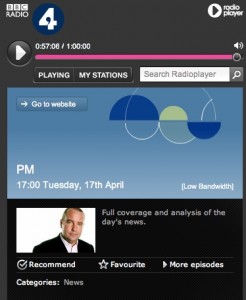 In my experience, sometimes when one is interviewing someone in the news, particularly a LIVE interview, things can take an unexpected turn. Your subject says things that you didn’t expect.
In my experience, sometimes when one is interviewing someone in the news, particularly a LIVE interview, things can take an unexpected turn. Your subject says things that you didn’t expect.
This morning, roused very early by an insistently affectionate cat (still getting over her spell in the cattery while we were at the beach last week) I tuned into BBC Radio 4’s PM programme and heard Eddie Mair’s interview with a Norwegian clinical psychologist Dr Roderick Orner about the 30 page ‘manifesto’ Anders Behring Breivik, the ‘ultra-right wing Nationalist’ who has admitted killing 77 people, presented to his trial.
Eddie, I think, had been expecting a ‘How is this guy insane? Let me count the ways’ track from the psychologist, but listen as he’s given a short course in the need to engage in debate with even those we characterize as ‘hateful extremists’ as part of our commitment to democracy. (This was the very same point I tried to make to Martyn Bradbury here: ‘On a collision course‘.)
Here’s a link to the 4 min 18 sec 4.1MB MP3 file for non-flash users (like moi).
Highlights:
“We should be very cautious about labeling things. We should be listen very carefully to what he says and not think of it as a man who is mentally ill who speaks. This is a man who is now the voice of the extreme right, of extreme ultra-Nationalism and of fundamentalism. And he speaks on behalf of forces that are loose in Europe and in other places in the world. If we just write this off as the statements of a madman we will suffer for this in the long term because we will not have listened to what he said. He’s warning us.”
“I think [to fail to listen to him because he is ‘a mad man trying to justify horrific actions’] would be something we would come to regret very much indeed.”
“One of the key points that we learned from Breivik last year was that here is a man who has refused to engage in debate. Part of his counter accusations now is that nobody has given him, and his body of opinion, a platform in which to have discussions.”
“What is so [is to] important to engage fundamentalism is to have open debate. This is not [to] justify his actions in any way but debate is a crucial aspect of democracy — all opinions should be represented.”
There are all sorts of justifications for refusing to engage in debate. Most of them, in my view, pretty weak.
– P


Hmmm.
“He[the sickly liberal lefty psychologist] wants us to LISTEN to the murderous ultra-right nut job?”
The psychologist is almost certainly a politically correct extreme lefty. It could be ivantheterrible.
Most right wing people would simply say – execute the nut job. A bullet to the back of the head will suffice.
The lefty is more likely to say (see above) – the environment, the childhood, the alienation, the poverty BLAH BLAH BLAH. Excuses layered on excuses.
No excuses. No need for these opinions. No need for debate. No need to listen. No need to compromise.
Some issues are actually quite straightforward. Don’t get confused by the lefty psychobabble.
Rgds,
*p*
Thanks for your comment.
Oh LOL!
But seriously, Breivik and his easy-to-hate ilk make it very easy to say ‘off with his head!’
One trouble is, as Aldous Huxley is alleged to have opined: “Facts do not cease to exist because they are ignored.”
If the psychologist is right that the ‘nut job’ “…is now the voice of the extreme right, of extreme ultra-Nationalism and of fundamentalism. And he speaks on behalf of forces that are loose in Europe and in other places in the world” it seems to me ignoring the debate is a very poor option.
Execution of those who are labeled ‘revolutionaries’ and ‘rebels’ would also have robbed the world of statesmen like Nelson Mandela and his ilk — if they’d been sent to the gallows instead of Robbin Island, or murdered like Steve Biko …
Mandela’s fellow lawyer Oliver Tambo relates the ‘radicalisation’ of black South African resistance to an unwillingness to listen:
from Nelson Mandela by Oliver Tambo http://www.sahistory.org.za/article/nelson-mandela-oliver-tambo
I’m not suggesting — remotely — that Breivic is a Nelson Mandela. But I am saying repression of dissent and your suggested approach:
“No excuses. No need for these opinions. No need for debate. No need to listen. No need to compromise.”
… (if you’re serious) has severe limitations and, with respect, risks being anti-democratic.
The Nuremberg trials gave the Nazi war criminals a chance to offer an account of their actions. Poormastery, why would you seek to apply a different standard today?
regards, – P
On the important issue of the cat waking me up: Watch this very clever feline … talk about wearing out your welcome!
Thanks to Cameron Slater for the link… and a real laugh!
– P
[…] I took this photo (above) this morning: my cat, looking for company, reaching under a door … which was what a recent You Tube video which I posted six days ago showed. […]